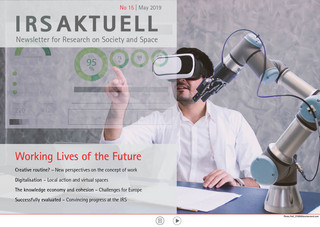Main Content
Working Lives of the Future
No 15 | May 2019

Change is the central hallmark of the world of work. There is hardly a generation that has not experienced upheavals in the ways in which they work – from the introduction of the assembly line to the introduction of paid parental leave for employees. That the Federal Ministry of Education and Research (BMBF) designated the title “Working Lives of the Future” for Science Year 2018 testifies to a phase of accelerated change and the many open questions about work of the future. The Leibniz Institute for Research on Space and Society isn‘t a classical labour-research institute – so why an issue of “IRS aktuell” on the Science Year?
Work is one of the central mechanisms of organisation in our society. The agreement to divide the accomplishment of essential tasks of coexistence, and to develop ever more complex principles of exchange and payment on this basis, first made many things possible that are taken for granted today: the specialisation of certain activities, leading to a turn away from the principle of subsistence, and thus to the formation of cities, in which each of us earns our livelihood rather than generating it ourselves. A connection can be made to the present day, in which work is the central social construct around which people orient their daily routines and their lives, and which forms the foundation of all economic cycles. From this point of view, it becomes clear what bearing research at the IRS has to the topic of work: questions of how cooperation between people is spatially organised, what potential certain configurations of cooperation have for innovation and creativity in organisations, or how migration movements or socio-spatial disparities directly connect to work demonstrate the high level of interdependence between aspects of work and socio-spatial transformation.

